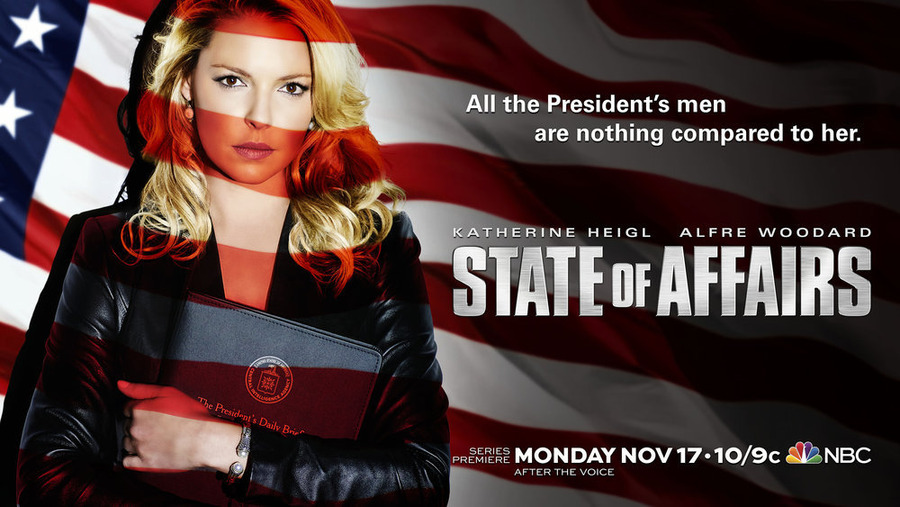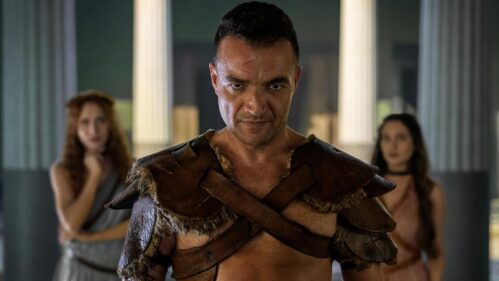Cluttered and implausible, the series premiere of NBC’s “State
of Affairs,” airing tonight, November 17th, after another sure-to-be
highly-rated episode of “The Voice,” hints at the show that could be engaging
underneath the poor filmmaking and even more frustrating writing and
performances. Katherine Heigl grits her teeth as if determination and
intelligence are the same thing, while the always-great Alfre Woodard looks
like she signed up for a show she thought would be more interesting. Directed
by underrated filmmaker Joe Carnahan (“The Grey”), the massively recut premiere
of “State of Affairs” (it’s in very different form from the original pilot I
saw six months ago) still falters by comparison to the shows that inspired it,
including “Homeland” and “The West Wing.” To be blunt, it’s just not nearly as
smart as either, and tries to disguise that with false intensity and hyperactive
production values. Don’t fall for it.
A miscast Heigl is in deep, over-her-head water as top CIA analyst
Charleston Tucker (Charlie for short). Like Carrie on “Homeland,” Charlie is
dealing with the trauma of a perceived mistake that led to tragedy. She was in a convoy in Kabul a
year ago with her fiancé, who also happened to be the son of President
Constance Payton (Woodard), when their vehicle was attacked and her lover was killed.
“State of Affairs” opens with this intense scene, something I imagine NBC hopes
will glue viewers to their seat in an explosive change of pace from their hit
reality singing competition. It’s like going from karaoke to “Call of Duty.”
A year after the death of the President’s son, Charlie is
living life on the edge, drinking too much and sleeping with strangers. There
are also those at her job who are convinced that her head isn’t fully in the
game anymore. She’s reckless, but not Carrie reckless. She never quite sells the idea that Charlie is unstable in any way. She looks too good all of the time. She’s NBC reckless, not
Showtime reckless.
While you sleep, Charlie heads a team of CIA analysts in the
assemblage of the President’s Daily Briefing, the “book” that highlights
everything the intelligence agency has learned in the last 24 hours—possible terrorist
chatter, updates on violence around the world, etc. On our first night with
Charlie and her team, they discover two major events—the kidnapping of a doctor
by an ISIS-like group who will likely behead him in the next few hours and
information on the whereabouts of a key terrorist target. Save the doctor or
kill the terrorist? Of course, “State of Affairs” takes place in a world in which
doing both is impossible. It wouldn’t be entertaining otherwise.
The suspension of disbelief required to enjoy “State of
Affairs” is remarkable. Not only are we asked to believe that a top CIA
analyst is making so many key decisions without consultation but that she’s
doing so in a red carpet-ready outfit while trying to escape pursuers attempting to
detain her. This is a program that reimagines a key figure in the CIA as a
superheroine, protecting us while trying to avenge her lover’s death and right the
wrongs of the world. Of course, there’s a conspiracy—hidden secrets about that
horrible night in Kabul—to carry us from episode to episode, but it’s the
overheated intensity scene to scene that’s more of a problem than the plotting. Everything is lit
from above like people in the CIA eat lunch under interrogation bulbs, and even
the sound mix is overdone to disguise the narrative problems. It’s television designed to shock and awe you,
hitting hot buttons like 9/11 and beheading videos in an attempt to tie itself
to realism, but mostly trying to exhaust the viewer instead of intellectually
stimulating him.
There are hints of the show that could work with finetuning,
mostly in the exchanges between Charlie’s team members at the CIA. Here’s where
“State of Affairs” reminds one of “The West Wing,” and pulling back the curtain
on how information is gathered and disseminated to the most powerful people in
the world could make for fascinating drama. In TV’s male-protagonist world, I
truly do like the idea of two women being our most essential protectors, but the
creators need to take that concept seriously. Trust your audience. Understand
that you don’t have to assault them with plot twists and camera tricks to
entertain. Only then will “State of Affairs” live up to the standards of the shows
that so clearly inspired it.














